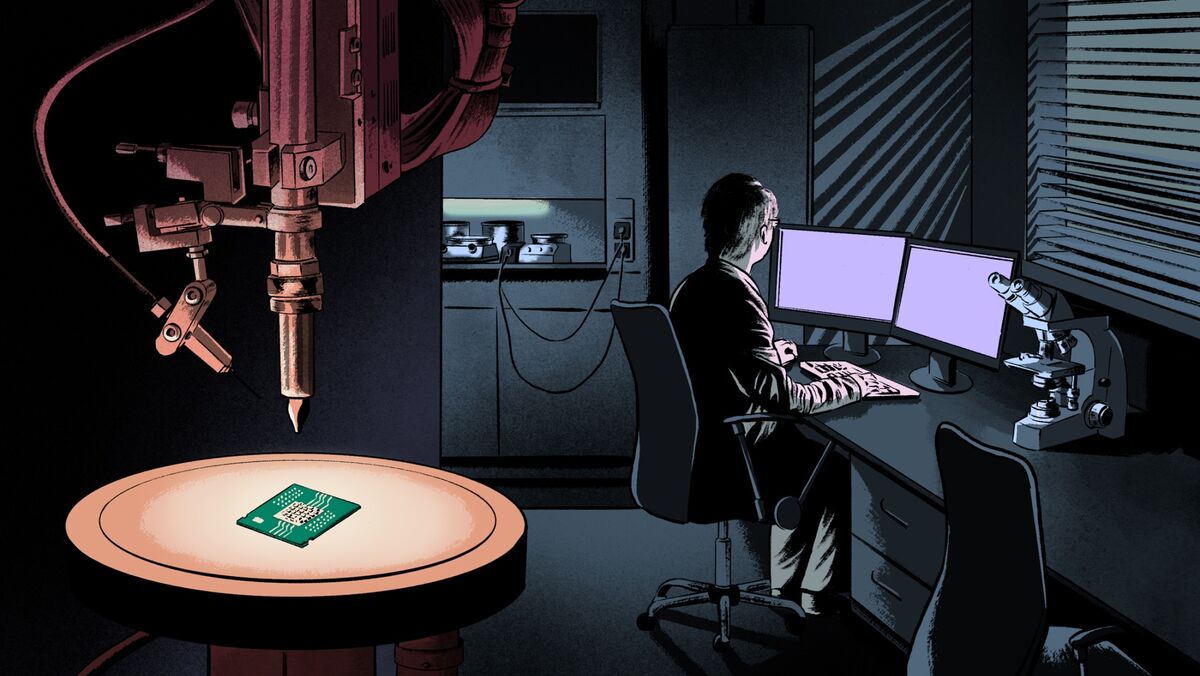Jordan Robertson and Cagan Koc
Wed, February 15, 2023 at 8:26 PM PST·4 min read

ASML Stolen Data Came From Technical Repository for Chip Machines
(Bloomberg) -- A China-based former employee of ASML Holding NV — a critical cog in the global semiconductor industry — stole data from a software system that the corporation uses to store technical information about its machinery.
The breach occurred in a repository that includes details of the lithography systems critical to producing some of the world’s most advanced chips, said people with knowledge of the situation. It was the first glimpse at the nature of the theft disclosed earlier Wednesday by ASML, which said a former worker in China had stolen confidential information but didn’t elaborate on what kind of data were taken.
The data came from a so-called product life cycle management program known as Teamcenter, said the people, who asked not to be identified because the information isn’t public. The tool is used internally, they said.
Teamcenter serves as a shared storehouse of technical information that allows different groups of employees to collaborate and manage their product development, according to the website of Siemens, which supplies the software. It allows for “common access to a single repository of all product-related knowledge, data and processes,” according to the website.
ASML declined to comment beyond the statement it issued earlier on Wednesday, in which the company said it didn’t believe the theft was material to its business. Siemens didn’t immediately respond to a request for comment.
The breach involved technological information but not hardware and was carried out by a male employee in the last couple of months, according to another person familiar with the details. Authorities in the US have been notified, said the person, who asked not to be identified because the investigation is ongoing. The US is “deeply concerned” about allegations of economic espionage, Assistant Secretary of Commerce for Export Administration Thea Kendler said in Tokyo on Thursday, declining to comment on the specifics of the incident.
This is the second such breach that ASML has linked to China in less than a year and comes as the US is pressuring other nations including the Netherlands to help keep China’s chipmaking abilities from advancing. Tensions are already high after an alleged Chinese spy balloon hovered over US airspace before being shot down. Secretary of State Antony Blinken called off a trip to Beijing — but was considering a meeting with China’s top diplomat in Germany this week, people familiar with the matter said.
Earlier on Wednesday, China’s Foreign Ministry spokesman Wang Wenbin said he wasn’t aware of ASML’s accusation that a former Chinese employee had misappropriated data.
The Dutch technology company, which makes machines needed to produce high-end chips used in everything from electric vehicles to military gear, has initiated an internal investigation and tightened security controls after discovering the most recent incident. It said on Wednesday that export controls may have been violated, exposing the company to a potential regulatory backlash.
The company’s position as a crucial part of the supply chain for technology that makes the fastest, most powerful chips, has made it a target. Last year, ASML, which employs about 1,500 people in China, accused a Beijing-based firm of potentially stealing trade secrets in a theft that dates back years.
In January, the Netherlands and Japan agreed to join the US in restricting exports of some advanced chipmaking machinery to China. President Joe Biden’s administration has said it’s essential for the US and its allies to block Beijing from acquiring technologies that could threaten global security.
Dutch Trade Minister Liesje Schreinemacher said in a statement that it’s “very worrying that such a large and reputable company is affected by economic espionage.”
It’s unclear whether the ex-employee who stole the data had any connections to authorities in China or elsewhere. ASML, which is restricted from selling its most-advanced machines to China, said in its annual report that the theft isn’t material to its business.
The Veldhoven-based company is one of the few producers of the machines needed to make mid- to high-range semiconductors. It’s the only manufacturer of lithography systems needed to shrink and then print patterns of transistors onto silicon wafers, which are then sliced into individual chips. A single machine can be the size of a bus and cost roughly $170 million.
Chief Executive Officer Peter Wennink has warned that China will ultimately develop its own domestic alternatives if it can’t buy from the West. China is ASML’s third-biggest market after Taiwan and South Korea. ASML and its peers sell their equipment to chipmakers such as Intel Corp. and Taiwan Semiconductor Manufacturing Co., which supply companies like Apple Inc. and Nvidia Corp.
ASML has previously accused Dongfang Jingyuan Electron Ltd. of obtaining ASML’s technology and transferring it to China. That technology was secured in a sometimes audacious fashion: One engineer was accused of stealing all 2 million lines of source code for critical ASML software and then sharing part of it with employees at Dongfang and a related company in the US, according to transcripts of the proceedings.

 finance.yahoo.com
finance.yahoo.com
Wed, February 15, 2023 at 8:26 PM PST·4 min read

ASML Stolen Data Came From Technical Repository for Chip Machines
(Bloomberg) -- A China-based former employee of ASML Holding NV — a critical cog in the global semiconductor industry — stole data from a software system that the corporation uses to store technical information about its machinery.
The breach occurred in a repository that includes details of the lithography systems critical to producing some of the world’s most advanced chips, said people with knowledge of the situation. It was the first glimpse at the nature of the theft disclosed earlier Wednesday by ASML, which said a former worker in China had stolen confidential information but didn’t elaborate on what kind of data were taken.
The data came from a so-called product life cycle management program known as Teamcenter, said the people, who asked not to be identified because the information isn’t public. The tool is used internally, they said.
Teamcenter serves as a shared storehouse of technical information that allows different groups of employees to collaborate and manage their product development, according to the website of Siemens, which supplies the software. It allows for “common access to a single repository of all product-related knowledge, data and processes,” according to the website.
ASML declined to comment beyond the statement it issued earlier on Wednesday, in which the company said it didn’t believe the theft was material to its business. Siemens didn’t immediately respond to a request for comment.
The breach involved technological information but not hardware and was carried out by a male employee in the last couple of months, according to another person familiar with the details. Authorities in the US have been notified, said the person, who asked not to be identified because the investigation is ongoing. The US is “deeply concerned” about allegations of economic espionage, Assistant Secretary of Commerce for Export Administration Thea Kendler said in Tokyo on Thursday, declining to comment on the specifics of the incident.
This is the second such breach that ASML has linked to China in less than a year and comes as the US is pressuring other nations including the Netherlands to help keep China’s chipmaking abilities from advancing. Tensions are already high after an alleged Chinese spy balloon hovered over US airspace before being shot down. Secretary of State Antony Blinken called off a trip to Beijing — but was considering a meeting with China’s top diplomat in Germany this week, people familiar with the matter said.
Earlier on Wednesday, China’s Foreign Ministry spokesman Wang Wenbin said he wasn’t aware of ASML’s accusation that a former Chinese employee had misappropriated data.
The Dutch technology company, which makes machines needed to produce high-end chips used in everything from electric vehicles to military gear, has initiated an internal investigation and tightened security controls after discovering the most recent incident. It said on Wednesday that export controls may have been violated, exposing the company to a potential regulatory backlash.
The company’s position as a crucial part of the supply chain for technology that makes the fastest, most powerful chips, has made it a target. Last year, ASML, which employs about 1,500 people in China, accused a Beijing-based firm of potentially stealing trade secrets in a theft that dates back years.
In January, the Netherlands and Japan agreed to join the US in restricting exports of some advanced chipmaking machinery to China. President Joe Biden’s administration has said it’s essential for the US and its allies to block Beijing from acquiring technologies that could threaten global security.
Dutch Trade Minister Liesje Schreinemacher said in a statement that it’s “very worrying that such a large and reputable company is affected by economic espionage.”
It’s unclear whether the ex-employee who stole the data had any connections to authorities in China or elsewhere. ASML, which is restricted from selling its most-advanced machines to China, said in its annual report that the theft isn’t material to its business.
The Veldhoven-based company is one of the few producers of the machines needed to make mid- to high-range semiconductors. It’s the only manufacturer of lithography systems needed to shrink and then print patterns of transistors onto silicon wafers, which are then sliced into individual chips. A single machine can be the size of a bus and cost roughly $170 million.
Chief Executive Officer Peter Wennink has warned that China will ultimately develop its own domestic alternatives if it can’t buy from the West. China is ASML’s third-biggest market after Taiwan and South Korea. ASML and its peers sell their equipment to chipmakers such as Intel Corp. and Taiwan Semiconductor Manufacturing Co., which supply companies like Apple Inc. and Nvidia Corp.
ASML has previously accused Dongfang Jingyuan Electron Ltd. of obtaining ASML’s technology and transferring it to China. That technology was secured in a sometimes audacious fashion: One engineer was accused of stealing all 2 million lines of source code for critical ASML software and then sharing part of it with employees at Dongfang and a related company in the US, according to transcripts of the proceedings.

ASML Stolen Data Came From Technical Repository for Chip Machines
(Bloomberg) -- A China-based former employee of ASML Holding NV — a critical cog in the global semiconductor industry — stole data from a software system that the corporation uses to store technical information about its machinery.Most Read from BloombergHow Much Do Investors Say They Need to...



